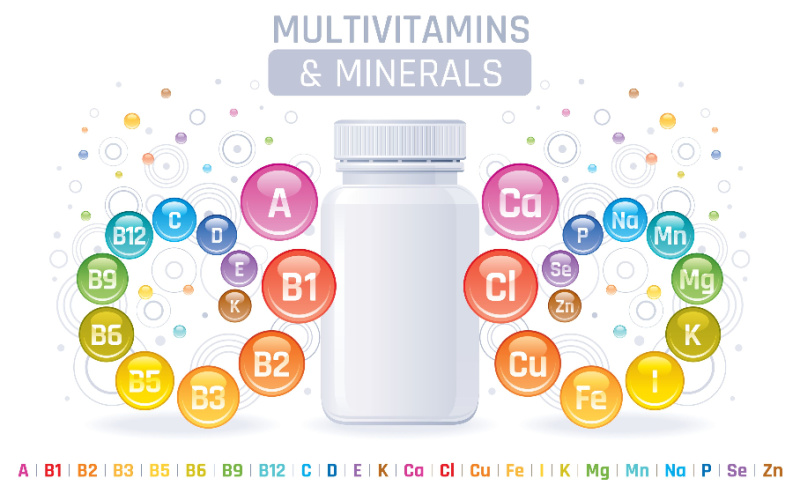Experts have long disputed the benefits of using multivitamins and minerals on the organism. Some say they do not make any significant improvement in your health. Others affirm that multivitamins will provide our body with substances not taken through the diet. Reports show that half of Americans take multivitamins with the hope that they will compensate for a poor diet, lack of sleep, or physical activity. But can a daily pill really make up for a poor diet?
Firstly, anyone with a nutritional deficiency should consider a medical check-up before using multivitamins. The doctors will determine if you should take one and help you figure out which one is the best. While there’s no need for a prescription to purchase them, and with their availability almost everywhere, you may be tempted to use them without consulting your doctor. But you should avoid doing that, in case you don’t want to throw your money down the drain on something you don’t actually need.
Secondly, don’t expect multivitamins and minerals to compensate for your unhealthy diet and unbalanced daily life. While they can positively impact your health, don’t think they will do any wonders and will restore your health. But let’s see what multivitamins and minerals are and whether we can benefit from them.
What are multivitamins and minerals?
A multivitamin supplement contains a combination of different vitamins and minerals. Given that there’s no standard for what constitutes a multivitamin, their nutrient composition varies by brand and product. They’re available in tablets, capsules, chewable gummies, powders, and liquids. Multivitamins are also known as multis, multiples, or vitamins.
Vitamins and minerals are essential nutrients required for the healing and functioning of the body. You don’t need a significant quantity, just milligrams to micrograms daily. But if you don’t get enough or the right kind of vitamins and minerals, essential functions cannot happen.
Although they are all considered micronutrients, vitamins and minerals differ. Vitamins can be broken down, but minerals cannot be broken into smaller chemical units. There are two types of vitamins: water-soluble and fat-soluble. The water-soluble vitamins are kept in the body for a short period, eliminating the excess through urine and sweat. Since water-soluble vitamins don’t last long in your body, they must be replenished frequently. Fat-soluble vitamins can be stored in fat tissue so that they can accumulate over time. When stored in your body’s fat, they can be stored for up to 6 months until your body needs them.
The ingredient lists of multivitamins and minerals range from brand to brand but commonly include the following:
- Fat-soluble vitamins: vitamins A (and beta-carotene), D, E, and K
- Water-soluble B vitamins: thiamin, riboflavin, niacin, pantothenic acid, vitamin B6, folic acid, and vitamin B12
- Minerals: iron, iodine, selenium, and zinc
In addition to vitamins and minerals, multivitamins might contain herbs, amino acids, and fatty acids.
Most multivitamins should be taken once or twice per day. Make sure to read the label and follow the recommended dosage instructions.
The benefits of using multivitamins and minerals
It is proven that inadequate specific vitamins and minerals can impair many biological functions. These inadequacies can lead to illness and chronic diseases, such as cancer, heart disease, type 2 diabetes, and cognitive dysfunction.
These vitamins and minerals produce enzymes and hormones. They boost immunity and keep your nerves and organs working properly. Your body also needs these nutrients for reproduction, maintenance, growth, and the regulation of bodily processes.
Multivitamins and minerals might contain these nutrients but in varying amounts.
The Food and Drug Administration (FDA) doesn’t control as rigorously the multivitamins as they do prescription drugs. So they may contain higher or lower nutrients than stated on the label.
Using multivitamins might benefit our health, but it is not guaranteed. The Physicians’ Health Study II conducted research among almost 15,000 male physicians over 50, showing no significant improvements. Still, over an average of 11 years, the study found multivitamin use decreased the risk of cancer by 8% and cataracts by 9%. But with no effects on cardiovascular disease, cognitive decline, or age-related macular degeneration.
However, a more recent study revealed that women taking a multivitamin for more than three years was linked to a lower risk of dying from heart disease.
A diet with plenty of fruits, vegetables, whole grains, good protein sources, and healthy fats should provide most of the nutrients needed for good health. But only some manage to eat a healthy diet. Those who suffer from nutrient deficiency might benefit from the use of multivitamins and minerals, especially particular categories of people that have a higher risk of developing this condition, like older people, pregnant women, or people with malabsorption conditions.
When choosing a multivitamin or mineral, look for one that contains the Recommended Daily Allowance amounts and bears the United States Pharmacopeia (USP) seal of approval on the label. This seal ensures that the ingredients and quantities of that ingredient listed on the label are contained in the pill.
Considering all of these aspects, it is safe to say that our bodies might benefit from multivitamins and minerals. Still, they won’t compensate for malnutrition, chaotic schedule, and lack of physical activity. But are there any risks that come along with their use?
The risks of using multivitamins and minerals
Multivitamins and minerals are usually safe for most people. When taken as directed, multivitamins are not expected to cause serious side effects. Common side effects may include an upset stomach, headache, or an unpleasant taste in the mouth.
But there are some higher risks for some categories of people.
A study discovered that calcium supplements could increase the risk of a heart attack. Many doctors recommend that individuals with a high risk of heart disease get their calcium through diet rather than supplements.
Another study found that certain supplements, including multivitamins, folic acid, iron, and copper, appeared to be associated with an increased risk of death in older women.
Smokers and former smokers should be cautious with beta-carotene and vitamin A dosage.
A large amount of these vitamins could increase the risk of lung cancer. Also, if you are pregnant, you should watch the amount of vitamin A because it could negatively influence your pregnancy.
As seen above, in most cases is just a matter of dosage. That’s why it is recommended to see a doctor before using any multivitamins. Also, if you take a multivitamin and are on medication, ensure these are safe to be taken with each other.
Conclusion
Living in fast-paced societies, we often seek the most time-effective solutions for our problems. Whether ordering food instead of cooking or driving to the office instead of walking or riding a bike, we often choose the most superficial quick fix. While our body might benefit from using multivitamins and minerals, it cannot compensate for our lack of sleep, inadequate nutrition, and insufficient physical activity. Therefore, before taking the various supplements available, ensure you have solved the problem from its root. Try to balance your diet and schedule, make sure you get enough sleep at regular hours and start doing more physical activity. It will positively impact your physical and mental health. And you won’t need to rely on multivitamins and minerals to get the right amount of nutrients.







